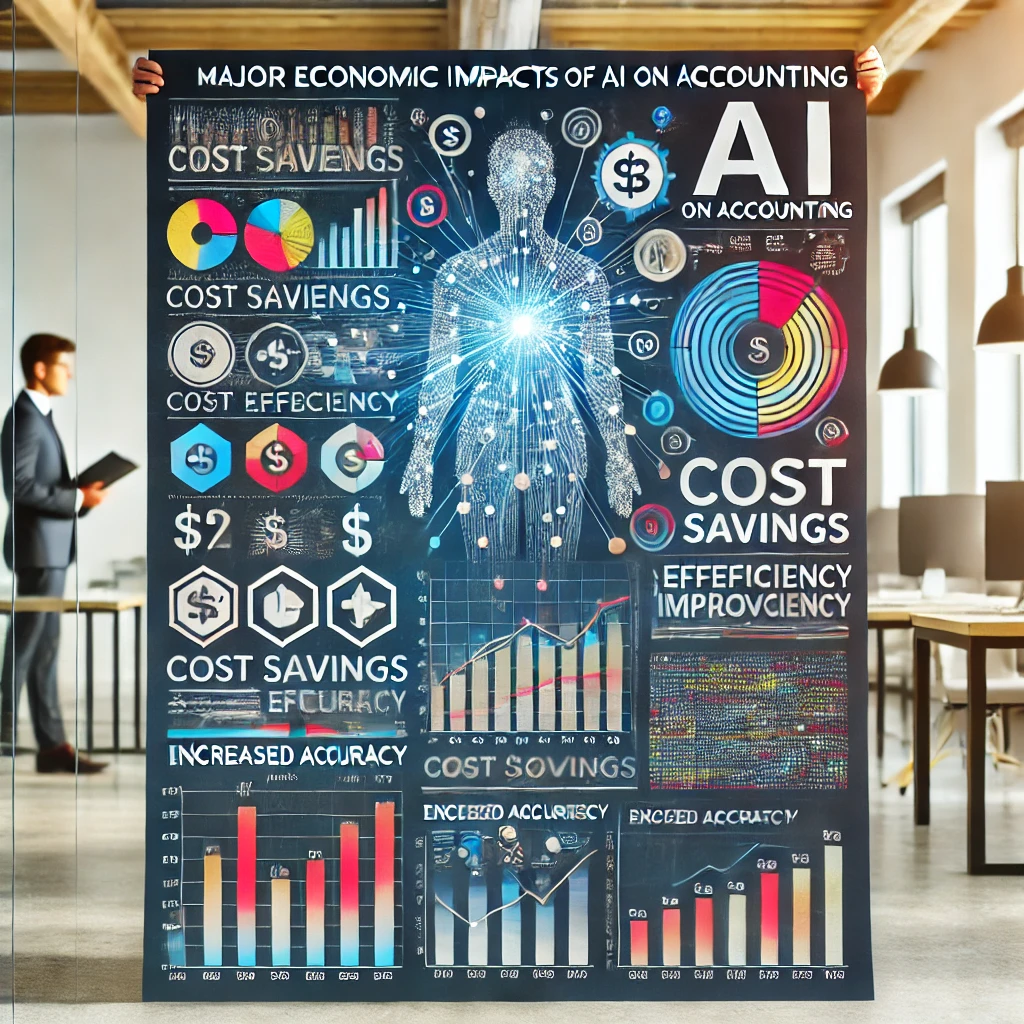
Introduction
Artificial Intelligence (AI) in Accounting has emerged as a groundbreaking force within the financial industry, particularly in Ottawa. This revolutionary technology challenges traditional financial systems by introducing new possibilities for financial inclusion, transparency, and efficiency. By leveraging advanced algorithms and machine learning, AI provides an open, decentralized alternative to conventional financial services. This article explores the impact of AI in accounting in Ottawa, its core principles, benefits, challenges, and future prospects, emphasizing its potential to reshape the financial landscape in the city.
Understanding AI in Accounting
Core Principles of AI in Accounting
AI in accounting operates on advanced algorithms and machine learning techniques. These systems remove intermediaries, providing transparent, auditable, and accessible financial services. Unlike traditional finance, AI promotes financial inclusivity and democratizes access to financial tools.
Technologies Underpinning AI in Accounting
- AI Algorithms in Accounting: The backbone of AI in Accounting, providing a decentralized ledger for transparent and immutable transactions.
- Smart Contracts in Accounting: Self-executing contracts with the terms of the agreement written directly into code, facilitating automated and trustless financial transactions.
Benefits and Opportunities of AI in Accounting in Ottawa
Accessibility and Financial Inclusion in Ottawa
Firstly, AI in Accounting empowers the unbanked and underbanked populations in Ottawa by providing access to financial services without the need for a traditional bank account. This democratization of finance can significantly impact global financial inclusion, especially in developing regions. For example, AI-driven mobile banking applications can reach remote areas, offering financial services to those previously excluded.
Transparency and Trust in AI Accounting
Moreover, by removing intermediaries, AI enhances transparency and trust in Ottawa’s financial sector. Every transaction is recorded on a public ledger, reducing the risk of fraud and corruption. This transparency fosters greater trust among users and regulators alike. For instance, real-time auditing capabilities enabled by AI can detect discrepancies immediately, ensuring the integrity of financial records.
Lower Costs and Greater Efficiency with AI Accounting
Furthermore, AI in Accounting streamlines financial transactions by eliminating intermediaries and reducing associated fees. This efficiency results in lower costs for users in Ottawa, making financial services more affordable and accessible. For example, AI-powered automated invoicing systems can significantly reduce administrative costs for businesses.
Innovative Financial Products and Services in Ottawa
AI has also introduced a range of innovative financial products and services, such as:
- AI-Driven Lending Platforms in Ottawa: Platforms like Aave and Compound allow users to lend and borrow assets without intermediaries.
- AI-Based Exchanges (AIXs) in Ottawa: Uniswap and SushiSwap enable peer-to-peer trading of cryptocurrencies.
- Yield Farming and Staking in Ottawa: Users can earn rewards by providing liquidity or staking their assets.
Challenges and Risks of AI in Accounting in Ottawa
Regulatory Concerns for AI in Ottawa
However, navigating the regulatory landscape is a significant challenge for AI projects in Ottawa. Compliance with varying regulations across jurisdictions is essential to avoid legal repercussions and promote mainstream adoption. For example, ensuring AI systems adhere to data privacy laws like GDPR is crucial for their acceptance.
Security Vulnerabilities in AI
Additionally, AI platforms in Ottawa are susceptible to smart contract exploits and hacking attempts. Ensuring robust security measures and conducting regular audits are crucial to protecting user funds and maintaining trust. For instance, multi-factor authentication and advanced encryption techniques can enhance the security of AI-driven financial platforms.
Market Volatility in AI
The AI market is also highly volatile, with price fluctuations and potential manipulation risks. Mechanisms to maintain stability and protect investors are necessary to mitigate these risks in Ottawa. For example, implementing AI-driven market analysis tools can help predict and manage volatility more effectively.
User Education and Adoption of AI
Lastly, widespread adoption of AI in Ottawa requires comprehensive user education to overcome barriers and ensure users understand the risks and benefits of decentralized financial systems. For example, financial literacy programs can help users navigate AI-driven financial tools confidently.
The Future of AI in Accounting in Ottawa
Integration with Traditional Finance in Ottawa
Looking ahead, AI in accounting and traditional finance in Ottawa are likely to coexist and collaborate, creating a hybrid financial ecosystem. Partnerships with established financial institutions can facilitate the integration of AI solutions into traditional banking systems. For example, banks may adopt AI-driven credit scoring systems to enhance their lending processes.
Scaling Solutions for AI
Scalability remains a critical issue for AI platforms in Ottawa. Solutions like Ethereum 2.0 and layer-2 protocols aim to increase transaction throughput and reduce fees, supporting the widespread adoption of AI. For instance, layer-2 solutions like Rollups can process thousands of transactions off-chain, reducing the load on the main blockchain.
Interoperability and Cross-Chain Compatibility in AI
Furthermore, interoperability between different blockchain networks is essential for a cohesive AI ecosystem in Ottawa. Cross-chain solutions enable seamless interaction between various AI platforms, enhancing user experience and liquidity. For example, Polkadot’s interoperability framework allows different blockchains to communicate and share data seamlessly.
Governance and Self-Regulation in AI
Decentralized governance models and self-regulation frameworks are crucial for the stability and sustainability of AI protocols in Ottawa. Community-driven governance can ensure transparency and adaptability. For instance, decentralized autonomous organizations (DAOs) enable stakeholders to vote on important decisions, ensuring democratic and transparent governance.
Conclusion
In conclusion, AI in accounting represents a transformative force within Ottawa’s financial industry, offering a new vision for the future of finance. By embracing transparency, accessibility, and innovation, AI has the potential to redefine traditional financial systems. However, challenges such as regulation, security, and adoption must be addressed for widespread acceptance and long-term success. With careful navigation and continuous advancements, the transformative power of AI can reshape the financial landscape and empower individuals globally.vigation and continuous advancements, the transformative power of AI can reshape the financial landscape and empower individuals globally.
*****************************************************************************************************************************************
Khaled (Kal) Hawari is based out of Canada, Ottawa, and is well versed in finance, accounting and fintech. With many years of experience in studying DeFi, traditional bluechip investments as well as graduating top of his class in undergrad, this article is a combination of personal opinion and research. From time to time, inspiration kicks in, and a drastically different topic of interest will be discussed and shared here!
Be sure sure to follow Khaled (Kal) Hawari on the following sites!
Socials
LinkedIn
YouTube
X (previously Twitter)
FaceBook
Instagram
Flickr (username khhawari92 or click the hyperlink!)
Important links for your consideration:
- Crunchbase
- Blogger
- Spreaker
- Wakelet
- Issuu
- Behance
- Medium
- DeviantArt
- Scoop.it
- Linktree
- Muckrack
- Soundcloud
- 500px
- About.me
- Scoop.it
- Wakelet
- Behance
- Pearltrees
- 500px
- DeviantArt
- Diigo
- Padlet
- Tripadvisor
- Blogger
- That AI Blog
- Issuu
- Edocr
- Diigo
- Slideshare
- Slideserve
- Instapaper
- Scoop.it
- Behance
- Wakelet
- Muckrack
- Padlet
- Pearltrees
- Open Spotify
- Anchor.fm
- Spreaker
- Podbean
- Soundcloud
- The Gig Economy: A Conversation with Khaled Hawari(Opens in a new browser tab)
- Blog(Opens in a new browser tab)
- Strategic Planning(Opens in a new browser tab)
- Artificial Intelligence in 2023: Impact and Ethics(Opens in a new browser tab)
- Ottawa Housing Market Insights: A Deep Dive with Khaled Hawari(Opens in a new browser tab)
- About(Opens in a new browser tab)
- Achieve Financial Success: Khaled Hawari’s Comprehensive Approach to Wealth Management(Opens in a new browser tab)
- The Rise of Fintech Startups in Ottawa: Opportunities and Challenges(Opens in a new browser tab)
- Expert Risk Management: Secure Your Finances with Khaled Hawari in Ottawa
- DeFi Revolution: Unlock Financial Freedom in Ottawa
- Book Now
- The Impact of Artificial Intelligence on the Accounting Profession
- Bank Consolidation and Cryptocurrency: Exploring Their Impact on Global Finance
- Introduction: Envisioning the Metaverse Future
- The Crisis of Food Affordability in Canada: An Interview with Khaled Hawari
- Privacy Policy
- AI in Accounting: Transforming the Financial Landscape in Ottawa
- Master Financial Crises: 2008 Lessons for Today’s Survival
DeepSeek vs ChatGPT: The Ultimate AI Rivalry
AI’s development, particularly in NLP, has been a gradual process marked by groundbreaking advancements. OpenAI’s ChatGPT led this charge…
Feb 06, 2025 / Read More
Apple’s Approach to AI: Innovation Rooted in Privacy and Usability
This article explores Apple’s latest developments in AI, shedding light on how the company is reimagining the future of technology while …
Feb 06, 2025 / Read More
The Quantum Puzzle: Unlocking the Secrets of Consciousness
Quantum mechanics and consciousness are two of the most intriguing and profound subjects in modern science. Since its inception in the ea…
Feb 05, 2025 / Read More
AI in Accounting: Transforming the Financial Landscape in Ottawa
Introduction
Feb 05, 2025 / Read More
The Rise of Fintech Startups in Ottawa: Opportunities and Challenges
Khaled (Kal) Hawari is based out of Canada, Ottawa, and is well versed in finance, accounting, and fintech. With many years of experience…
Jul 06, 2024 / Read More
The Impact of Artificial Intelligence on Ottawa’s Job Market
Khaled (Kal) Hawari is based out of Canada, Ottawa, and is well versed in finance, accounting, and fintech. With many years of experience…
Jul 06, 2024 / Read More
Celebrating Ottawa’s Vibrant Summer 2024: Festivals, Events, and More
Posted on: July 6, 2024Author: Khaled (Kal) Hawari
Jul 06, 2024 / Read More
The Future of Wealth Management: Strategies, Innovations, and Trends in 2024
Khaled (Kal) Hawari is based out of Canada, Ottawa, and is well versed in finance, accounting and fintech. With many years of experience …
Jun 09, 2024 / Read More
The Future of Sustainable Investing: Trends, Strategies, and Impact
Khaled (Kal) Hawari is based out of Canada, Ottawa, and is well versed in finance, accounting and fintech. With many years of experience …
Jun 09, 2024 / Read More
Khaled Hawari Ottawa: A Finance and Accounting Expert with Global Expertise
In the ever-evolving world of finance and accounting, professionals who possess extensive expertise and a multicultural perspective are h…
Feb 14, 2025 / Read More
The Power of Detailed Bookkeeping, Strategic Planning, and Tax Expertise for Your Business…
As a business owner or entrepreneur, the foundation of your success rests on several crucial pillars — financial management, planning for…
Jan 31, 2025 / Read More
Khaled Hawari Ottawa: The Strategic Planner Guiding Businesses to Success
In the dynamic world of business, staying ahead of the curve requires more than just intuition — it demands strategy, foresight, and the …
Jan 17, 2025 / Read More
Khaled Hawari Ottawa’s Approach to Efficient Financial Reporting and Taxation
Precision and knowledge are critical in the financial and accounting fields. Khaled (Kal) Hawari Ottawa, a distinguished finance and acco…
Dec 16, 2024 / Read More
How Khaled Hawari Ottawa Language Skills Boost His Finance Expertise
In today’s globalized business world, the ability to communicate across different languages is more than just an advantage — it’s a criti…
Aug 12, 2024 / Read More
Kal Hawari Ottawa’s Approach to Implementing IFRS Standards
Khaled (Kal) Hawari, an esteemed finance and accounting professional based in Ottawa, brings a wealth of experience to the field. His tri…
Jul 25, 2024 / Read More
Khaled (Kal) Hawari: Mastering Finance and Accounting in Ottawa
In the bustling city of Ottawa, a name stands out in the field of finance and accounting: Khaled (Kal) Hawari. With an impressive career …
Jun 13, 2024 / Read More




